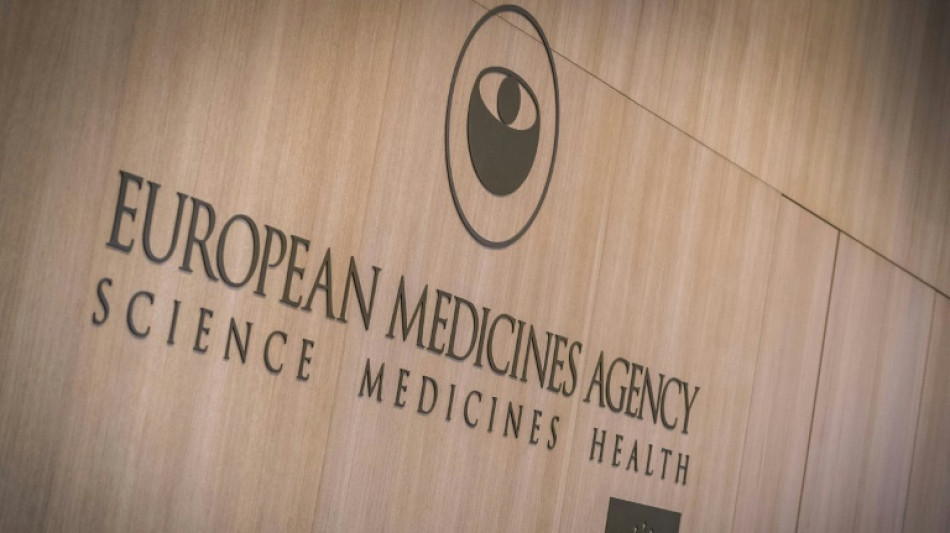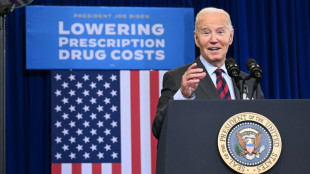
| RYCEF | -0.29% | 6.78 | $ | |
| RBGPF | 1.61% | 62 | $ | |
| CMSC | 0.04% | 24.579 | $ | |
| VOD | 1.39% | 8.985 | $ | |
| RELX | 0.64% | 47.11 | $ | |
| GSK | 1.03% | 34.375 | $ | |
| RIO | 0.53% | 62.36 | $ | |
| BP | 0.91% | 29.225 | $ | |
| NGG | 1.21% | 63.6 | $ | |
| BTI | 1.09% | 38.125 | $ | |
| CMSD | -0.45% | 24.32 | $ | |
| SCS | 0.04% | 13.545 | $ | |
| BCE | 2.02% | 27.18 | $ | |
| JRI | 1.33% | 13.418 | $ | |
| AZN | 1.12% | 67.115 | $ | |
| BCC | -0.65% | 147.445 | $ |

European medicines watchdog rejects new Alzheimer's drug
Europe's medicines watchdog on Friday rejected a marketing request for a new Alzheimer's disease treatment, saying the risks of the medicine's side effects, including potential brain bleeding, outweighed the benefits.
The decision by the Amsterdam-based European Medicines Agency was met with dismay, but experts said effective treatment for the degenerative mental disease affecting millions in Europe alone, was getting closer.
"The CHMP recommended not granting a marketing authorisation for Leqembi, a medicine intended for the treatment of Alzheimer's disease," the European Medicines Agency said, referring to its committee for evaluating drugs for human use.
Leqembi, which was developed by US multinational Biogen and Japanese-based Eisai, is the brand name of an active substance called lecanemab, which is used to treat adults with mild memory and cognitive problems resulting from the early stages of the common type of dementia.
But the CHMP said "the observed effect of Leqembi on delaying cognitive decline does not counterbalance the risk of serious side events associated with the medicine."
"The most important safety concern with Leqembi is the frequent occurrence of amyloid-related imaging abnormalities (ARIA), a side effect, seen in brain imaging, that involves swelling and potential bleedings in the brain," the EMA said.
- 'Unmet need' -
Leqembi is a monoclonal antibody, a type of protein that clings to a substance in the brain and can delay worsening of the disease. It is given intravenously every two weeks.
Leqembi, together with another Alzheimer's drug called Aduhelm -- also developed by Biogen and Eisai -- received approval from the US Food and Drug Administration (FDA) early last year.
Both drugs were approved through an accelerated process by the FDA for drugs treating serious conditions where there is an unmet medical need.
But in late January this year, Biogen pulled the controversial Aduhelm from the market, saying it was focusing on Leqembi instead.
Preliminary data from a trial of Leqembi was released in September 2022 and found it slowed cognitive decline in Alzheimer's patients by 27 percent.
Around eight million people in the European Union live with dementia, with Alzheimer's disease accounting for more than half of these cases, according to the Alzheimer Europe website.
Eisai, in a statement, said it was "extremely disappointed with the CHMP's negative opinion".
"There is a significant unmet need for new innovative treatment options that target an underlying cause of disease progression," Eisai's chief clinical officer Lynn Kramer said.
Eisai said it would seek a re-examination of the EMA's opinion "to ensure this treatment is available for eligible people living with early Alzheimer's disease in the EU as soon as possible."
The EMA said Eisai presented a main study involving 1,795 people with early Alzheimer's who either received Leqembi or a placebo, measured over a span of 18 months.
Eisai said that the watchdog added that its refusal had "no consequences for patients in clinical trials with Leqembi".
Eisai may now ask for a re-examination within 15 days, the EMA said.
- 'Ramp up efforts' -
Experts voiced disappointment at the EMA's refusal, but added there were "reasons to remain hopeful".
"Lecanemab has shown that it is possible to slow down disease progression, and research does work," said Tara Spires-Jones, president of the British Neuroscience Association.
"Now we need to ramp up our efforts to discover new and safer treatments," she said in a statement, adding that "each discovery brings us closer to new and better treatments."
Bart De Strooper, a professor in Alzheimer's disease at the University College London called the EMA's decision "unfortunate yet not unexpected".
"This conservative approach means that patients and doctors eager to explore a proven effective drug are now denied access," he said in a statement.
"With no current therapies available, it's disheartening to think that if we had applied such caution in the past, particularly with cancer drugs and their severe side effects, we might still be without cancer treatments today," De Strooper said.
H.Brunner--HHA


